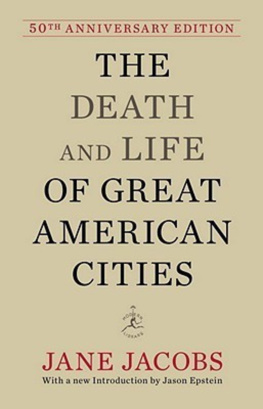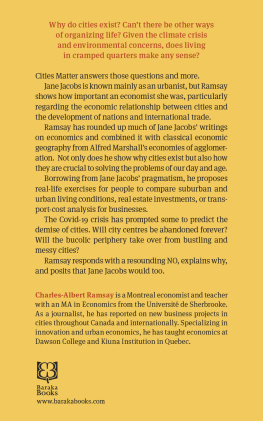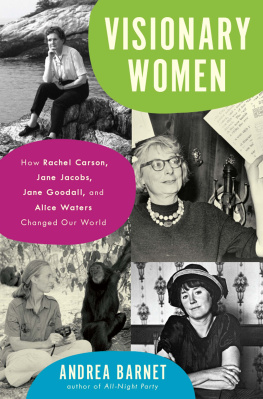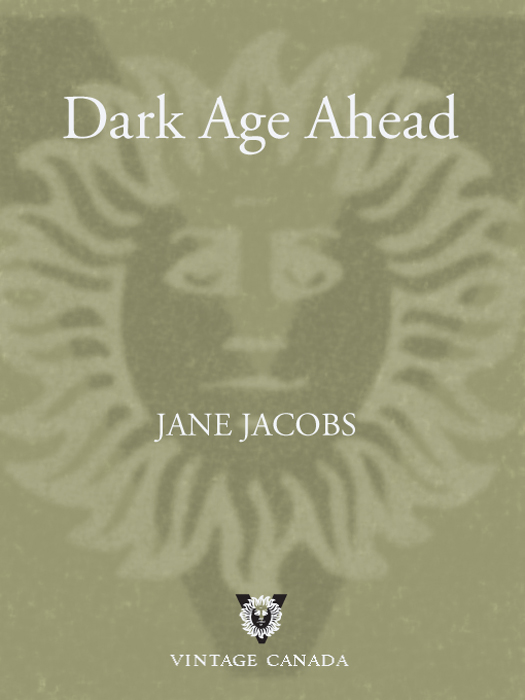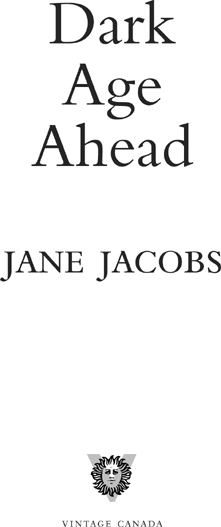Acclaim for Jane Jacobs
Dark Age Ahead
Why do prosperous civilizations suddenly fail? Could it happen to us? These are the questions Jacobs addresses. If a cultural meltdown awaits us, the enemy, Jacobs is saying, will be us.
Times Colonist (Victoria)
Jane Jacobs has been right about so much for so long that when she writes gloomily of a Dark Age Ahead, we all better listen. Prescient.
Austin American-Statesman
Crisp, entertaining, scholarly, scary.
Kirkus Reviews
A short, terse and often lyrical book that sets the wistful against the hopeful. This book is a warning, artfully and profoundly dressed as a reminder. Thanks to Jacobs for pointing the way.
St. Petersburg Times
Scholarly yet accessible certain to spark debate. [A] unique addition to the genre of social forecasting.
Library Journal
Compact and compelling. A spellbinding account of the forgetting and misplacing of shared values, assets, and skills that may lead the contemporary Western world into widespread social, economic, and physical disaster.
The Globe and Mail
Jacobs has always championed neighborhoods. Now she has extended her ideas about community to include the culture at large. We should stick around and listen up.
Newsweek
We need voices such as hers giving us more learned views of emerging society, cautioning us to stand firm on values worth remembering. Prophets have been ignored before, but Jane Jacobs seems to be getting deserved attention. Lets hope it stems the corrosion she predicts.
The Thunder Bay Chronicle-Journal
Dense with dynamic thoughts and delivered in a way that is simultaneously concise, ruminative, and non-confrontational.
The Vancouver Sun
Jacobs purpose is to help our society avoid sliding into a dead end. Hubris, meaning pride (as in pride before a fall), is the word she uses to describe our cultures arrogant stance and our refusal to learn from the past, which she sees as hurtling us toward our own demise.
The Kingston Whig-Standard
A sweeping survey of a civilizationourson the brink of catastrophe. What makes Dark Age Ahead worth a read is the way in which its author brings her famously independent and inductive mind to bear in fresh ways on familiar topics.
Berkeley Daily Planet
Here is a book that should be read by politicians of all levels; and by the rest of us too.
Red Deer Advocate
Jane Jacobs is the kind of writer who produces in her readers such changed ways of looking at the world that she becomes an oracle, or final authority.
The New York Sun
The renowned Jane Jacobs, that champion of courteous living and student of what should be decent human conduct, is a civic treasure.
Toronto Star
JANE JACOBS
Dark Age Ahead
Jane Jacobs is the legendary author of The Death and Life of Great American Cities, a work that has transformed the disciplines of urban planning and city architecture. Her other major works include The Economy of Cities, Systems of Survival, and The Nature of Economies. She lives in Toronto.
ALSO BY JANE JACOBS
The Death and Life of Great American Cities
The Economy of Cities
The Question of Separatism
Cities and the Wealth of Nations
Systems of Survival
The Nature of Economies
T O
S ID A DILMAN AND
M ARTHA S HUTTLEWORTH ,
MERRY LEADING-EDGE EXPLORERS
CONTENTS
ONE
TWO
THREE
FOUR
FIVE
SIX
SEVEN
EIGHT
CHAPTER ONE
The Hazard
This is both a gloomy and a hopeful book.
The subject itself is gloomy. A Dark Age is a cultures dead end. We in North America and Western Europe, enjoying the many benefits of the culture conventionally known as the West, customarily think of a Dark Age as happening once, long ago, following the collapse of the Western Roman Empire. But in North America we live in a graveyard of lost aboriginal cultures, many of which were decisively finished off by mass amnesia in which even the memory of what was lost was also lost. Throughout the world Dark Ages have scrawled finis to successions of cultures receding far into the past. Whatever happened to the culture whose people produced the splendid Lascaux cave paintings some seventeen thousand years ago, in what is now southwestern France? Or the culture of the builders of ambitious stone and wood henges in Western Europe before the Celts arrived with their Iron Age technology and intricately knotted art?
Mass amnesia, striking as it is and seemingly weird, is the least mysterious of Dark Age phenomena. We all understand the harsh principle Use it or lose it. A failing or conquered culture can spiral down into a long decline, as has happened in most empires after their relatively short heydays of astonishing success. But in extreme cases, failing or conquered cultures can be genuinely lost, never to emerge again as living ways of being. The salient mystery of Dark Ages sets the stage for mass amnesia. People living in vigorous cultures typically treasure those cultures and resist any threat to them. How and why can a people so totally discard a formerly vital culture that it becomes literally lost?
This is a question that has practical importance for us here in North America, and possibly in Western Europe as well. Dark Ages are instructive, precisely because they are extreme examples of cultural collapse and thus more clear-cut and vivid than gradual decay. The purpose of this book is to help our culture avoid sliding into a dead end, by understanding how such a tragedy comes about, and thereby what can be done to ward it off and thus retain and further develop our living, functioning culture, which contains so much of value, so hard won by our forebears. We need this awareness because, as I plan to explain, we show signs of rushing headlong into a Dark Age.
Surely, the threat of losing all we have achieved, everything that makes us the vigorous society we are, cannot apply to us! How could it possibly happen to us? We have books, magnificent storehouses of knowledge about our culture; we have pictures, both still and moving, and oceans of other cultural information that every day wash through the Internet, the daily press, scholarly journals, the careful catalogs of museum exhibitions, the reports compiled by government bureaucracies on every subject from judicial decisions to regulations for earthquake-resistant buildings, and, of course, time capsules.
Dark Ages, surely, are pre-printing and preWorld Wide Web phenomena. Even the Roman classical world was skimpily documented in comparison with our times. With all our information, how could our culture be lost? Or even almost lost? Dont we have it as well preserved as last seasons peach crop, ready to nourish our descendants if need be?
Writing, printing, and the Internet give a false sense of security about the permanence of culture. Most of the million details of a complex, living culture are transmitted neither in writing nor pictorially. Instead, cultures live through word of mouth and example. That is why we have cooking classes and cooking demonstrations, as well as cookbooks. That is why we have apprenticeships, internships, student tours, and on-the-job training as well as manuals and textbooks. Every culture takes pains to educate its young so that they, in their turn, can practice and transmit it completely. Educators and mentors, whether they are parents, elders, or schoolmasters, use books and videos if they have them, but they also speak, and when they are most effective, as teachers, parents, or mentors, they also serve as examples.


